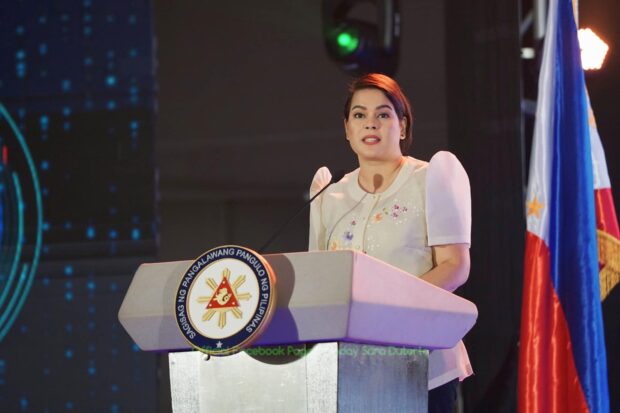
Vice President Sara Duterte | PHOTO: Official facebook page of Inday Sara Duterte
MANILA, Philippines — On World Children’s Day, Vice President Sara Duterte emphasized the need to address climate change, a threat which she says disproportionately impacts children and threatens their future.
“The Climate Crisis is a Child Rights Crisis,” declared Duterte in a statement, during the commemoration of World Children’s Day with the United Nations Children’s Fund (Unicef) in Quezon City,
“From rising sea levels and harsh weather to air pollution and resource scarcity, the climate crisis affects children’s lives, education, and health. And climate change is hitting Filipino kids hard,” she added.
Duterte noted that the country is prone to natural disasters such as typhoons and earthquakes, as well as human-induced disasters like conflict, insurgency, and terrorism.
She also cited reports such as the World Risk Index for 2022, which ranks the Philippines first in disaster risk; and a 2019 World Bank Policy Research Working Paper, which estimates the Philippines’ average annual asset losses due to disasters at US$1.4 billion, while well-being losses are higher at an estimated $3.9 billion annually.
These displacements, said Duterte, cause increased diseases, respiratory illnesses, and long-term mental health issues among children.
It also affects children’s learning as it forces them to miss school, which in turn affects their future.
“Disasters have far-reaching consequences, especially the trauma in children. Kami nga na mga magulang, nata-trauma kami. Paano nalang ang mga bata (us parents get traumatized. What about the children?),” said Duterte.
Because of this, Duterte emphasized the need to invest in climate-resilient communities and infrastructure to protect children from the effects of climate change.
“Along with other government and donor agencies, we must give our children and youth meaningful participation in fighting climate change,” said Duterte.
According to Duterte, adults have a crucial role in creating an environment where children can thrive and contribute to a sustainable future.
READ: PH youth, most vulnerable to climate change, also most active in fighting crisis
“We can start by reducing our carbon footprint and living sustainably,” said Duterte.
“We must also promote programs that encourage kids to improve their community’s disaster resilience,” she added.
READ: 9.7 million Filipino kids displaced by disasters – Unicef
Duterte also said that the Philippines can set an example by creating a national plan to engage children and youth in disaster risk reduction and climate action at the local and national levels by establishing children and youth groups, providing community education, training, learning exchanges, and lobbying and influencing policy.
READ: Unicef urges Duterte gov’t to act on record child abuse cases
“The Philippines can lead by solving the climate crisis and protecting children’s rights,” she added.
The vice president said that the upcoming COP28, or the Conference of the Parties (COP) to the UN Framework Convention on Climate Change (UNFCCC) presents a critical opportunity for the Philippine government to design and implement child-responsive climate action that prioritizes the needs and perspectives of children.